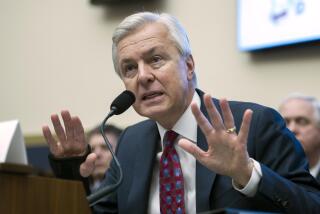Merrill Signs Deal to Avoid Prosecution in Enron Case
- Share via
HOUSTON — Merrill Lynch & Co. on Wednesday avoided potentially devastating criminal charges in the Enron Corp. scandal by agreeing to a series of reforms, while federal prosecutors charged three former Merrill bankers with conspiring to pad Enron’s reported earnings.
The Merrill agreement could have far-reaching implications for Wall Street’s relationships with corporate customers, some experts said. The firm dodged prosecution by promising the government it would change its procedures, accept outside oversight and report complex transactions directly to clients’ outside auditors.
“Merrill Lynch becomes a watchdog of clients, not a lapdog or conspirator,” U.S. prosecutor Andrew Weissmann said outside the federal courthouse in Houston, calling the agreement a model for the financial services industry. “We’re satisfied that they get it.”
Meanwhile, the three former Merrill bankers -- Daniel Bayly, James Brown and Robert Furst -- pleaded not guilty to charges that they conspired to help Enron record a phony profit and pad its earnings with a loan disguised to look like a sale.
The three were involved in a transaction that helped Enron meet a 1999 profit target through a sham sale of three barges carrying generators and moored off Nigeria, prosecutors say.
The men, accompanied by their lawyers, surrendered at the FBI’s office in Houston. They later appeared, in handcuffs, before U.S. Magistrate Judge Marcia Crone, who freed them each on $100,000 bond after they pleaded not guilty.
All were charged with conspiring with Enron executives to commit wire fraud and to falsify books and records, which carries a maximum sentence of five years in prison.
Brown also was charged with obstruction of justice and perjury for statements he made to a federal grand jury investigating Enron, for which he could face up to 15 more years in prison.
Lawyers for Bayly and Furst said that their clients were wrongfully accused and that they intended to fight the accusations at trial. Brown’s lawyer declined to comment.
Brown was accused of telling the grand jury he knew nothing of Enron’s oral promise, made by former Chief Financial Officer Andrew S. Fastow, to buy back the barges within six months at a 22% profit to Merrill. The buyback promise, prosecutors say, made the transaction a loan that never should have been recorded on Enron’s books as a sale.
That accusation forms one part of a separate, 109-count indictment against Fastow, who was charged with conspiracy, fraud and money laundering in May for engineering the barge deal and other transactions. He has pleaded not guilty.
Furst, who was Merrill’s relationship manager with Enron, resigned from the investment bank in 2001. Bayly, who retired last fall, was the head of Merrill’s investment banking division.
A report from Enron bankruptcy examiner Neal Batson said Bayly ordered Brown, then a top banker in Merrill’s project finance division, to close the deal after Fastow promised to buy the barges back.
The discovery of widespread financial wrongdoing at Enron led the Houston energy giant to implode in a then-record bankruptcy filing in December 2001, with shock waves that rocked the financial world and led to an unprecedented crackdown on corporate corruption.
Merrill Lynch has previously said it acted properly in the barge deal. But in the deal it signed Wednesday with the Justice Department, the firm promises to cooperate with the Enron investigation and establish oversight measures for transactions similar to the barges deal.
Merrill stock fell 6 cents to $55.16 on the New York Stock Exchange.
More to Read
Inside the business of entertainment
The Wide Shot brings you news, analysis and insights on everything from streaming wars to production — and what it all means for the future.
You may occasionally receive promotional content from the Los Angeles Times.










